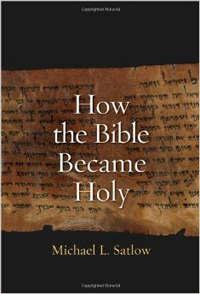Book Notes
 Michael L. Satlow, How the Bible Became Holy (New Haven: Yale University Press, 2014), 350pp.
Michael L. Satlow, How the Bible Became Holy (New Haven: Yale University Press, 2014), 350pp.
For most Jews and Christians today, the Bible is in some sense a divinely inspired book. To say that is to state the obvious. In my Episcopal church, for example, our worship service begins when our priest processes down the center aisle while elevating a bright red book of the four gospels above his head. These aren't the words of Shakespeare or Homer. They aren't even man's word about God, as Karl Barth once said — the Bible is God's word about man.
This might be true today for many Jews and Christians, but that wasn't always the case. In this social history of sacred scripture, Michael Satlow, Professor of Religious Studies and Judaic Studies at Brown University, shows when and how the Bible gained its authority, how across almost two thousand years a random collection of historical texts became a holy canon. For Jews, this didn't happen until the 11th-century, and for Christians, some time in the late fourth century.
Satlow begins with the Northern Kingdom of Israel in the ninth century BCE, and works his way through to rabbinic Judaism of the early third century. In the last part of the book there are individual chapters on Jesus, Paul, the gospels, and the early Christians. For Satlow, there were three main types of textual authority in antiquity — normative, literary, and oracular. Texts and their authority played only minor roles in the lives of most people in antiquity, he says. Texts were the privileged preserve of the few people who had the leisure, the money, and the training to read and write.
As the centuries rolled by, this textual equilibrium was punctuated by figures like Hezekiah, Josiah, Ezra, and the Greek translation of the Hebrew Bible. Synagogues for the public reading of scripture didn't arise until the first century. As you would expect when dealing with antiquity, some of this historical reconstruction, he admits, is "highly speculative," "open to debate," and dependent upon "very few written artifacts" or "fragmentary evidence." The dust jacket blurbs hail the work as "provocative," "controversial," and a challenge to "fundamental assumptions about the nature of biblical authority."
Unless you believe with Mormons that the Bible dropped from heaven in gold tablets, or an older dictation theory of inspiration, in some ways Satlow has presented a scholarly version of what Jews and Christians have always known — that the book of psalms or a letter from Paul, for example, wasn't venerated as an inspired text at the moment of its composition. The inspiration and authority of Scripture, however hard to define or document, underwent a deeply human and historical process. And whereas sacred texts were marginal for most people for a long time, that's not the case now. And so the final sentence of his book: "This is perhaps the Bible's greatest legacy: the radically implausible notion that one can build a community, a religion, a culture, and even a country around a text."


